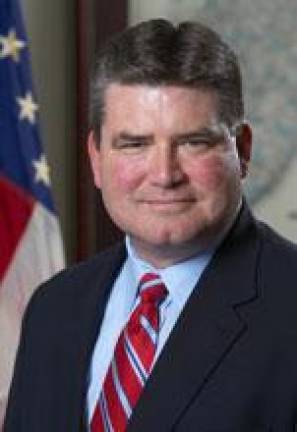Bill shields homeowners from unexpected fees
Legislation. A bill sponsored by Senator Steve Oroho has cleared committee and would shield local homeowners from unexpected fees.

Bipartisan legislation sponsored by Senator Steve Oroho (R-Sussex, Warren, Morris) that would protect homeowners in some communities from surprise fees and assessments was advanced by the Senate Community and Urban Affairs Committee.
Sen. Steve Oroho’s bill clarifies the intent of a 2017 law and protecting homeowners in some communities from unexpected fees and assessments. (SenateNJ.com)
“When someone purchases property that isn’t in an association, they shouldn’t have to worry about fees being forced on them,” said Oroho. “The 2017 law did not change the rules for owners who were not already members of an association or planned community. This bill provides homeowners with badly needed protections from unexpected financial burdens. I thank my co-prime sponsor, Senator Troy Singleton, for moving the bill so quickly in this new session.”
The bill passed both houses last session, but was conditionally vetoed by Governor Murphy. The bill (S-908) as introduced by Senator Oroho this session reflects the language in the governor’s conditional veto. The Assembly companion will be introduced by Assemblymen Hal Wirths and Parker Space (both R-Sussex, Warren, Morris).
Provisions of the Radburn Law, enacted in 2017, have been misinterpreted by some community associations as an opportunity to levy fees and enact rules on homeowners who are not members of the association. Oroho’s bill affirms that homeowner associations cannot require fees if the association did not have the authority to compel payment prior to July 13, 2017. Planned real estate developments can compel owners to pay for maintaining the neighborhood’s common areas. Fees can be substantial, especially in lake communities where dams must be supported.
Some lake association advisors used the Radburn Law, enacted to bolster protection for residents and strengthen voting rights in common communities, to justify the assessment of annual fees to all owners in developments.
“Very simply, the Radburn Law did not speak to fees, but rather dealt with voting rights and disclosure,” said Oroho. “As the governor recognized in his CV statement, the bill responds to the ‘misrepresentation of the 2017 law among certain planned communities that have used the law to impose new dues and assessments on owners.’ It’s unfortunate some have not honored the original intent of the Radburn Law.”